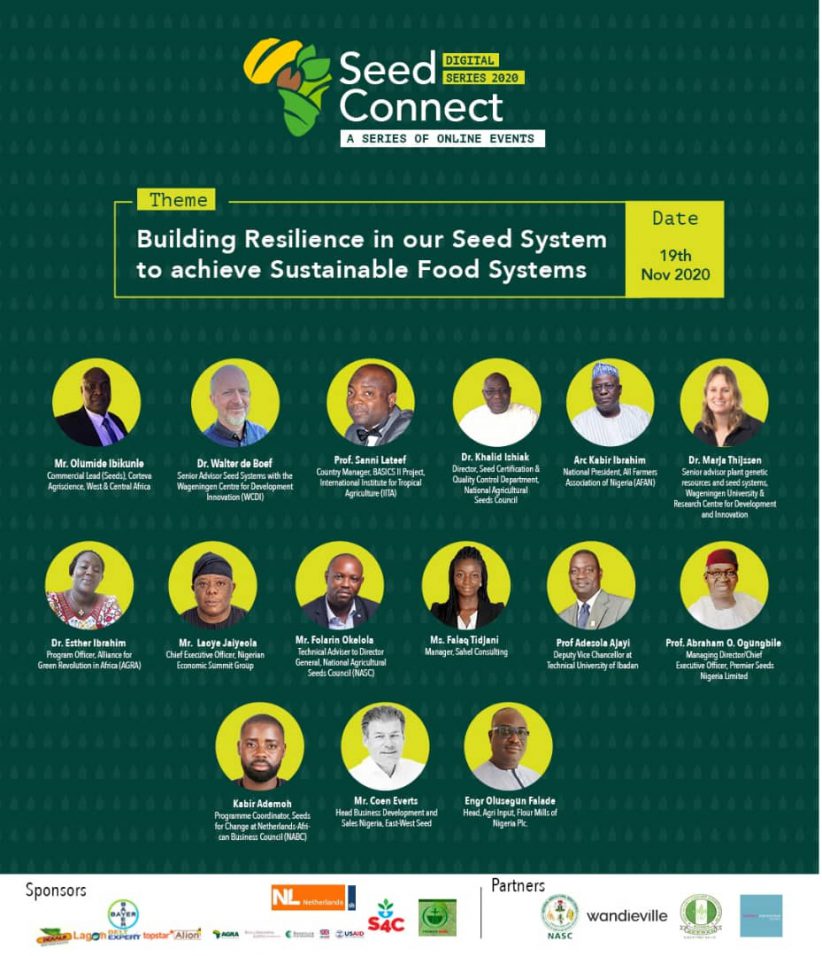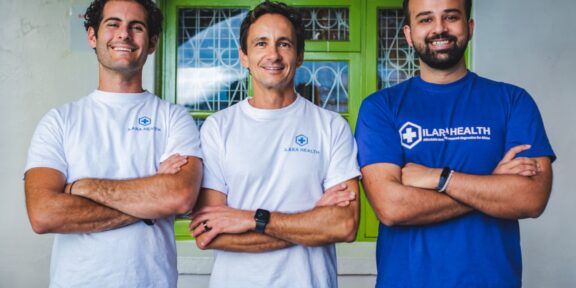The National Agricultural Seed Council (NASC) put as a series of webinars involving relevant stakeholders within Nigeria, Africa, and the Netherlands to discuss a pathway to rethink and propose a sustainable pathway; proffer solutions on challenging issues, and bring to limelight agripreneur opportunities for women and youths in the seed industry.
The first day of the webinar was held on Thursday 19th November 2020, and anchored by Ms. Wandie Kazeem, CEO, Wandieville media. It began with a welcome address by Dr. Philip Ojo, Director General, NASC. He stated that he was pleased that the SeedConnect Conference is gaining momentum in the continent. He further explained that the event will impact positively on the sector, he noted…”the importance of the SeedConnect event cannot be overemphasized as it brings together stakeholders in the seed industry from all parts of the world to deliberate on issues and topics affecting the seed industry all over the continent…” H.E Harry van Dijk, Ambassador to Nigeria, Embassy of the Kingdom of Netherlands, said that he believes the conference will help build a vibrant sector for the continent and it will guide efforts of the private sector.
The first session “Unveiling Nigeria’s New Multi-Year Seed Roadmap and the way forward” began with a presentation by Dr. Marja Thissen, a researcher at the Wageningen University & Research Centre for Development and Innovation. She mentioned that a system that ensures the provision of quality seeds at the right place and time has to be developed, thus the relevance of the National seed road map for Nigeria; a framework that establishes an action plan for the country’s seed system. It will be executed by NASC in partnership with key stakeholders in the system in the Kingdom of Netherlands, in her words “seeds need to be available at the right time, place, quality, quantity and affordable prices. All these have to be available at the same time“. According to Ms. Falaq Tidjani, Senior Manager, Sahel Consulting, the National Seed road map covers a broad aspect of the seed sector and will address various challenges in the industry, she noted…”this is going to be a sustainable project to create solutions to address bottlenecks in the sector”. To close the session, Mr. Folarin Okeola, Technical Advisor to the Director-General of the National Agriculture Seed Council (NASC) assured participants that the issues raised in the event will be implemented and stated that he was pleased about the development of the road map because it will play a vital role in ensuring that activities within the seed sector are adequately coordinated to build a resilient seed system. Mr. Boaz Blackie Keizire, Head, Policy, Advocacy & Africa Food Prize Secretariat, Alliance for a Green Revolution in Africa (AGRA) during his speech, emphasized the role the seed sector plays in building the foundation for other activities in the value chain, he said: “Every human being is as good as the quality of the seed that produced you. Paying more attention to the quality of seed is very important not just as human beings but as farm inputs”.
During the first panel discussion themed “COVID-19’s impact on the Nigerian seed industry and building back better” players in the seed sector made relevant contributions on how to build back a resilient seed system to withstand future shocks in the sector. The panellists for this session were; Mr Olumide Ibikunle, Commercial Business Leader, Corteva Agriscience; Dr. Walter De Boef, Senior Advisor Seed Systems, Wageningen Centre for Development Innovation (WCDI); Prof. A. O. Ogungbile, MD/CEO, Premier Seeds Nigeria Limited; Prof. Lateef Oladimeji, Project Manager, BASICS II, International Institute for Tropical Agriculture, IITA and Mr. Folarin Okeola, Technical Advisor to the Director General of the National Agriculture Seed Council (NASC), the moderator of the session. They explored the challenges the pandemic revealed in the space. During the discussion, the following points were established to address various challenges mentioned: relevant data compilation to effectively create sustainable agro-tech innovations to proffer solutions in the system and holistic analysis of the sector to understand the structure of the agricultural sector. According to Mr Olumide Ibikunle , there has to be a change of mind-set, holistic approach and strong re-engineering of the whole process. He said, “we need to look at the sector holistically…we need to look at a way of forecasting for 3-5years with adequate data”. Dr. Ernest Aubee, Head, Department of Agriculture, ECOWAS Commission, Abuja Nigeria during his speech, commended the organizers of the event, in his words, “we do appreciate the ideas being proposed and we want to ensure that these ideas will be incorporated”.
The second panel discussion themed “Closing the Seed Demand Gap while ensuring access to Improved seed varieties to achieve food security” was targeted to address pain points of players in the seed sector and inform public and private sector decisions to close the seed demand gap in the sector. The panellists for the session were Dr Ishiak Khalid, Director, Seed Certification & Quality Control Department, NASC; Mr. Coen Everts, Head of Business Development & Sales, East-West Seed Nigeria; Prof Sola Ajayi, Agricultural Scientist, Obafemi Awolowo University, Nigeria; Mr. Laoye Jaiyeola, Chief Executive Officer, Nigerian Economic Summit Group (NESG); Engr. Falade Olusegun, Business Head, Golden Fertilizer business, Flour Mills Nigeria. ; Mr Kabir Ademoh, Program Coordinator, Seed for Change at Netherlands-African Business Council (NABC); Mr Eugene Agbicodo, Product Development Manager, RIJK ZWAAN; ARC Kabiru Ibrahim, National President, All Farmers Association of Nigeria (AFAN) and Dr. Esther Ibrahim, Program Officer, AGRA Kaduna State, Nigeria, the moderator of the session. The discussion was centered on suggestions to improve accessibility and adoption of improved seed varieties by smallholder farmers. Major highlights of the session include: organization of more research by seed companies to produce appropriate hybrid seeds/ fertilizer blends to meet actual demands of smallholder farmers, a proper analyses of the market demand by seed companies and community awareness programs to inform farmers of the benefits of improved seed varieties. Mr. Eugene Agbicodo advised farmers to use improved seed varieties to enhance their yield, he said…”it is better to start with clean and good quality seed with good agronomic practices than starting with the wrong seed. You get ahead of those who just start with any kind of seed”.
The closing remarks and words of appreciation were given by Dr. Ishiak Khalid. He assured participants that the contribution will be transformed into ambitions to set the pace for a resilient seed system in the continent.







